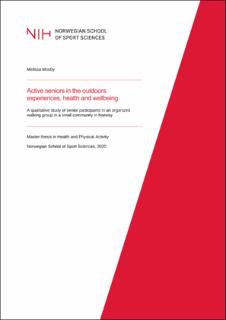| dc.description.abstract | Background: We are now living longer, and as these changes evolve, there is a need to consider environments that promote health and wellbeing among older adults. Nature has been an object of many studies, considering its effects on both physical and psychological function and wellbeing, and several theories exist on our relation to natural environments. With the increase of interest in nature’s role in overall health, and with the perception of the concept friluftsliv in Norwegian society, there now exists a variety of walking groups for older adults. However, there is a need for research into how these walking groups may influence various aspects in the life of mature, aged adults and how one can facilitate and motivate such a group.
Purpose: The purpose of this study was to gain knowledge on how older adults experience participating in a walking group, who they are and how they perceive their own health through the weekly walking tour. Furthermore, how a walking group is facilitated in a way that it promotes positive aspects of the participants health and wellbeing. The following research questions were addressed: “What characterizes senior participants in an organized walking group, and how do they perceive their own health through the weekly walking tour? How informants experience and reflect on participation, health and wellbeing.”
Method: The study uses a qualitative method inspired by phenomenology, where data was collected through semi-structured, in-depth interviews. The informants were recruited from a walking group in a small community in Norway and interviews were transcribed and analyzed phenomenologically by systematic text condensation.
Findings: The informants describe the walking group as an arena for socializing and communicating with other participants, and several of them highlight this aspect of the walking tour. Other aspects described as important were the abilities to continue to be physically active and enjoy the natural surroundings, and where some informants were more preoccupied with the sensory experiences than others were. However, mood and happiness were shown to be harder for the informants to describe. The findings also show that many of the informants have always enjoyed activity in nature in numerous ways throughout their life. Another perspective in the findings suggest that there may be more women than men participating in the walking group, however, this is not something the informants think of much.
Conclusion: This study suggests that walking groups may influence mature aged adult’s perceived health and wellbeing positively. Informants reflect on their participation as a way of continuing to be active and connect with other people. Participating in the group may be a way of coping with the fear of being lonely and fear of losing their physical function. Furthermore, the facilitating of the walking group seems to be important and inspiring work for the tour leaders, as well as making the weekly walking group a place where participants can achieve a sense of meaningfulness and belonging. | en_US |
